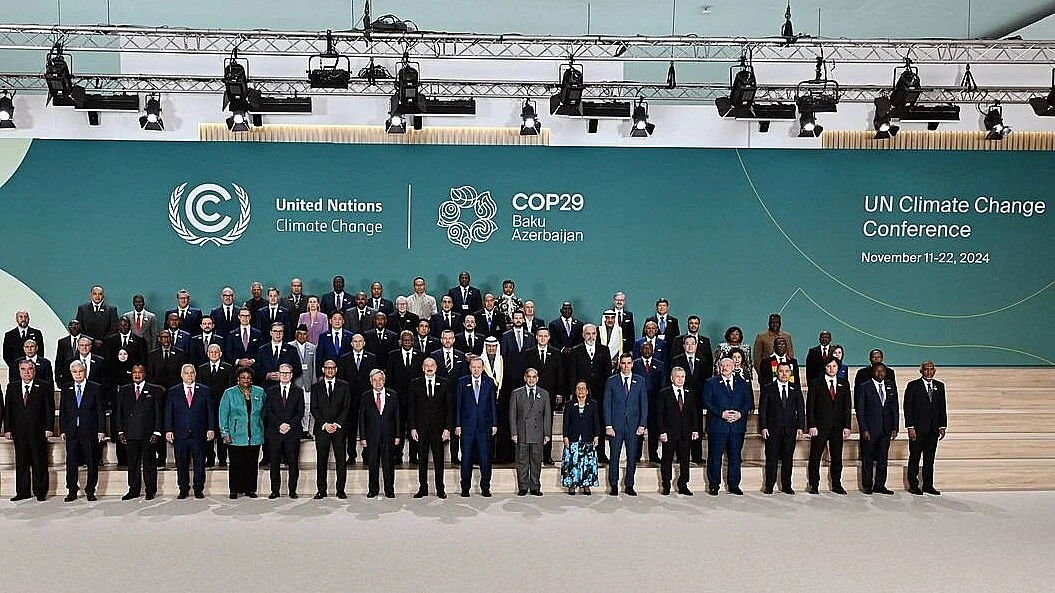Fossil fuel advocates bagged over 5,000 UN climate summit entries in 4 years
New research shows 5,350 lobbyists linked to at least 859 coal, oil and gas organisations participated in climate talks from 2021-24

More than 5,000 fossil fuel lobbyists have been granted access to United Nations climate summits over the past four years, according to new research that raises questions over industry influence at negotiations meant to advance global climate action.
The findings, shared with The Guardian by the coalition Kick Big Polluters Out (KBPO), show that around 5,350 lobbyists linked to at least 859 coal, oil and gas organisations participated in climate talks from 2021 to 2024. These firms span the entire fossil fuel supply chain, from exploration to distribution, and include 180 oil, gas and coal companies.
According to the analysis, 90 of these companies accounted for 57 per cent of global oil and gas production in 2024, producing 33,699 million barrels of oil equivalent. The newly released Global Oil and Gas Exit List, covering more than 1,700 companies, shows that the same 90 firms are also responsible for 63 per cent of near-term upstream expansion projects.
If completed, these projects would generate enough oil to blanket 2.623 million sq. km at a depth of 1 cm — roughly equivalent to the combined landmass of France, Spain, Germany, Denmark, Sweden, Finland and Norway.
Corporate infiltration
Civil society groups say the findings highlight the scale of corporate access amid worsening climate impacts and stalled progress on limiting global warming to 1.5°C. “This information clearly exposes corporate capture of the global climate process,” said Adilson Vieira of the Amazonian Work Group. “The space that should be about science and the people has been transformed into a large carbon business hall.”
Indigenous groups also renewed calls for fossil fuel lobbyists to be barred from COP (Conference of Parties, the main decision-making body of the United Nations Framework Convention on Climate Change) summits. “We need to take down the ‘for sale’ sign on Mother Earth,” said Brenna Yellowthunder of the Indigenous Environmental Network.
COP30 opens on Monday, 10 November in Belém, in Brazil’s Amazon region, which faces rapid environmental degradation driven by fossil fuel exploration, industrial agriculture and mining. The summit will bring countries together under the UNFCCC and the Paris Agreement to negotiate emissions pathways and climate finance.
The research examined lobbyist registrations at COP26 in Glasgow, COP27 in Sharm el-Sheikh, COP28 in Dubai and COP29 in Baku, the first years for which such information has been collated. At COP29 alone, 1,773 fossil fuel lobbyists were registered — around 70 per cent more than the total delegations of the 10 most climate-vulnerable nations.
The figures exclude company executives embedded in country delegations or attending as government guests, meaning the real number of industry representatives at the talks is likely higher.
Big oil gatecrashes climate summits
Major oil companies, including Shell, BP, ExxonMobil and Chevron, have regularly sent representatives to recent COPs. Combined, the four firms recorded more than $420 billion in profits over the past five years. Meanwhile, Exxon chief executive Darren Woods is scheduled to speak at a COP30 launch event in Brasília this week.
Petrobras, which sent at least 28 lobbyists to recent summits, said it would attend COP30 to “contribute to international debates on climate and energy”. The Brazilian state-linked firm recently received approval to drill off the Amazon coast.
This year, COP delegates must publicly disclose the funding behind their participation and certify alignment with UNFCCC objectives. However, the requirement does not apply to government delegations or overflow representatives.
Advocates say transparency alone is insufficient. “Transparency without exclusion is performative,” said Mohammed Usrof of the Palestinian Institute for Climate Strategy. “The UNFCCC must move from disclosure to disqualification.”
The UNFCCC secretariat said it has taken steps to enhance transparency and that governments determine their own delegations.
Follow us on: Facebook, Twitter, Google News, Instagram
Join our official telegram channel (@nationalherald) and stay updated with the latest headlines
